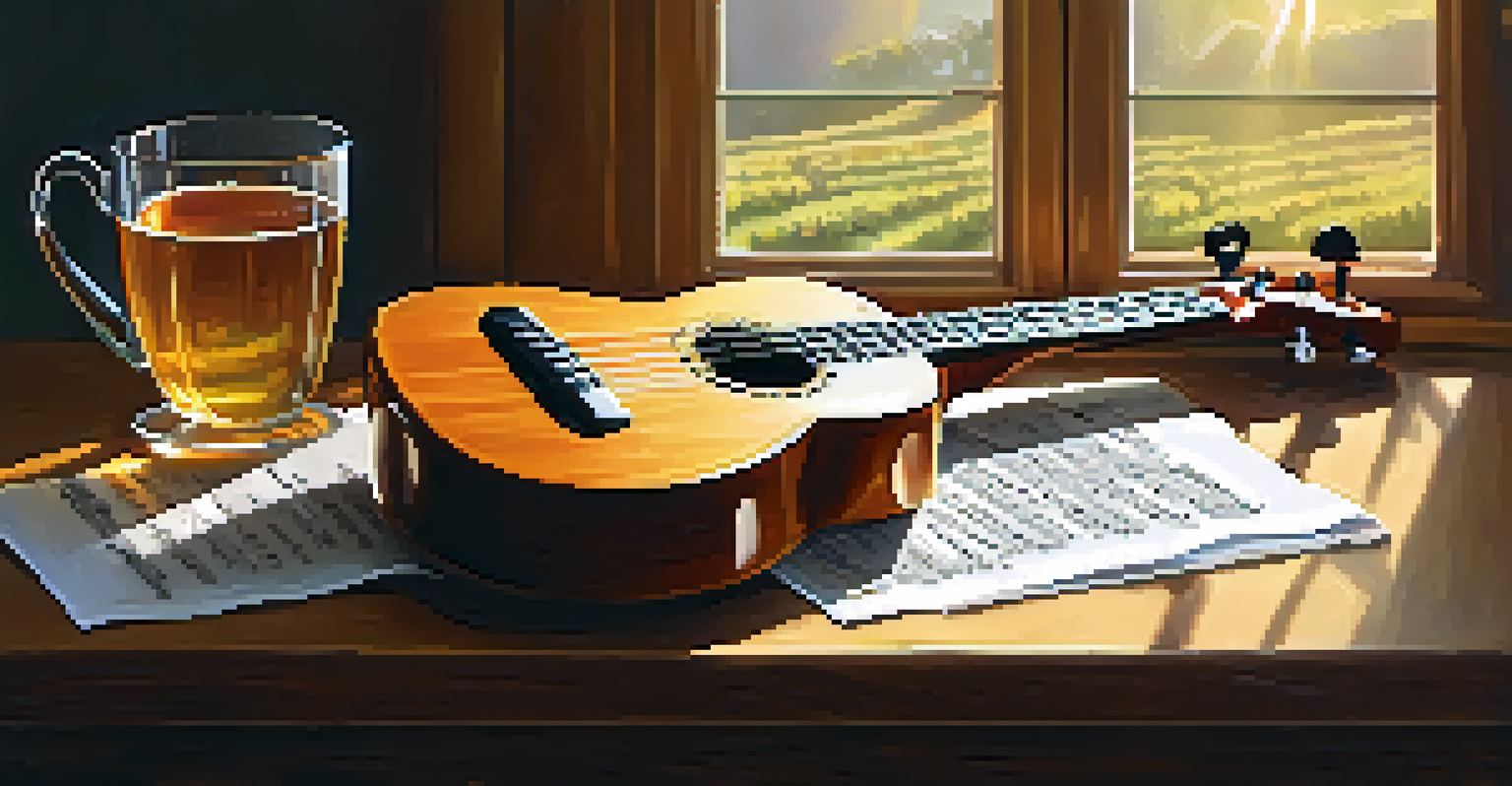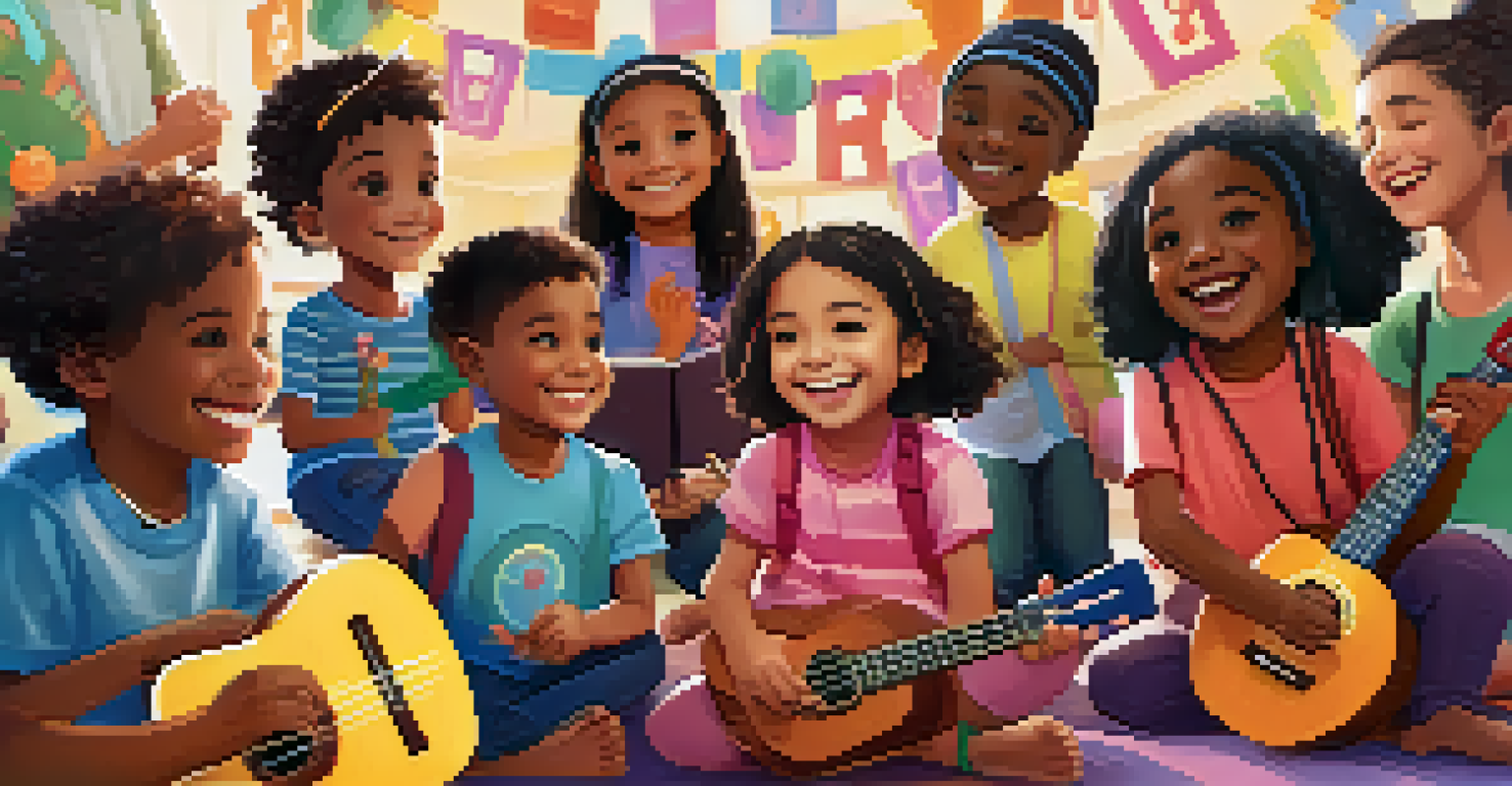Fostering Unity: How Ukulele Music Breaks Cultural Barriers

The Ukulele: A Brief History of Its Global Journey
The ukulele, often associated with Hawaiian music, has a rich history that spans continents. Originally from Portugal, it made its way to Hawaii in the 19th century, where it quickly became a symbol of local culture. Over the years, its cheerful sound resonated with diverse audiences, leading to its adoption in various musical genres worldwide.
Music is the universal language of mankind.
As it traveled, the ukulele adapted to different cultures, incorporating unique playing styles and melodies. For instance, in the Philippines, it evolved into a staple in folk music, while in Japan, it became popular in both traditional and modern settings. This flexibility showcases how the instrument can transcend its origins and embrace new influences.
Today, the ukulele is celebrated in global music festivals, bridging gaps between cultures. Whether it's a Hawaiian luau or a street performance in Paris, the ukulele unites people, reminding us that music is a universal language that can connect us all.
The Role of Music in Cultural Exchange
Music acts as a powerful vehicle for cultural exchange, breaking down barriers that often separate communities. When people engage with music from different cultures, they gain insight into those traditions and values. The ukulele, with its inviting sound, encourages collaboration and sharing among musicians from various backgrounds.

For example, community events featuring ukulele performances often bring together diverse groups, fostering interactions that might not happen otherwise. These gatherings create a space for storytelling, where participants share their experiences through music, enhancing empathy and understanding.
Ukulele's Global Cultural Journey
The ukulele has traveled from Portugal to Hawaii and beyond, evolving to reflect diverse musical styles across cultures.
Moreover, educational initiatives using the ukulele—like workshops and classes—allow individuals to learn about different cultural perspectives while honing their musical skills. This mutual learning fosters respect and appreciation, paving the way for unity among diverse populations.
Ukulele Festivals: Celebrating Diversity in Music
Ukulele festivals have sprouted up around the globe, celebrating the instrument's versatility and the cultural diversity it embodies. These events attract musicians and enthusiasts from various backgrounds, creating a melting pot of styles and genres. It's not uncommon to see a Hawaiian hula dancer performing alongside a jazz ukulele player, illustrating the instrument's adaptability.
Where words fail, music speaks.
During these festivals, attendees often participate in workshops that highlight different cultural approaches to playing the ukulele. This hands-on experience allows individuals to engage with new techniques and musical styles, enhancing their appreciation for global music traditions. The lively atmosphere encourages networking and collaboration, strengthening bonds between cultures.
In essence, ukulele festivals serve as a microcosm of cultural unity, where people come together to celebrate their differences through shared love for music. These gatherings remind us that, despite our unique backgrounds, we can find common ground through creativity and expression.
The Ukulele as a Tool for Social Change
The ukulele has emerged as a powerful tool for social change, particularly in initiatives aimed at fostering inclusivity and community engagement. Organizations worldwide use ukulele programs to connect marginalized groups, promoting healing and collaboration through music. This approach helps individuals express their stories, breaking the silence that often surrounds difficult topics.
For instance, music therapy programs incorporating the ukulele have shown positive results in mental health settings, providing a creative outlet for those facing emotional challenges. Participants often find solace in the simple act of strumming chords and singing, fostering a sense of belonging and connection.
Music as a Tool for Unity
Through community events and festivals, the ukulele fosters connections and understanding among people from different backgrounds.
Additionally, grassroots movements centered around the ukulele often encourage participants to advocate for social issues, such as environmental awareness or cultural preservation. By harnessing the instrument's joyful spirit, these initiatives inspire collective action, reminding us that music can be a catalyst for positive change.
Stories of Unity: Personal Anecdotes from Ukulele Players
Many ukulele players have heartwarming stories that highlight the instrument's ability to foster unity. For example, a musician who traveled to a foreign country found that playing the ukulele on a street corner attracted locals, leading to spontaneous jam sessions. These shared moments bridged language barriers and created lasting friendships, showcasing the ukulele's power to connect people.
Another inspiring tale comes from a community center where ukulele classes brought together children from different backgrounds. Through music, these kids not only learned to play but also developed a sense of camaraderie, breaking down stereotypes and building friendships. The laughter and joy shared during practice sessions resonated far beyond the classroom.
These anecdotes illustrate that the ukulele is more than just an instrument; it's a tool for creating memories and fostering relationships. Each strum and each note serves as a reminder of our shared humanity, reinforcing the idea that music can indeed unite us all.
The Global Ukulele Community: Connecting Through Online Platforms
In today’s digital age, the ukulele community has expanded significantly through online platforms. Websites, forums, and social media groups allow enthusiasts from around the world to connect, share tips, and collaborate on projects. This virtual space nurtures a sense of belonging, as players can interact regardless of geographical limitations.
Online tutorials and workshops have also made it easier for newcomers to learn the ukulele, encouraging people from diverse backgrounds to pick up the instrument. Many players share their cultural influences through online performances, showcasing the rich tapestry of musical styles available. This sharing fosters mutual respect and appreciation for different traditions.
Digital Community of Ukulele Players
Online platforms have expanded the ukulele community, allowing players worldwide to share their cultural influences and collaborate.
Ultimately, these online connections contribute to a global community that celebrates unity through music. The ukulele, once confined to specific regions, now resonates in living rooms and cafes worldwide, uniting players and listeners alike in a shared love for this delightful instrument.
Conclusion: The Ukulele's Enduring Power to Unite Cultures
In conclusion, the ukulele stands as a testament to the power of music to transcend cultural boundaries. Its cheerful sound and versatility invite collaboration, fostering connections among diverse groups. Whether through festivals, social initiatives, or online communities, the ukulele serves as a bridge that brings people together.
As we explore the stories and experiences shared by ukulele players, it's clear that this humble instrument holds the potential for profound impact. By embracing cultural diversity through music, we can cultivate understanding and unity in our increasingly fragmented world.

So, the next time you hear the strumming of a ukulele, remember that it's not just music—it's a celebration of our shared humanity, inviting us all to join in harmony.